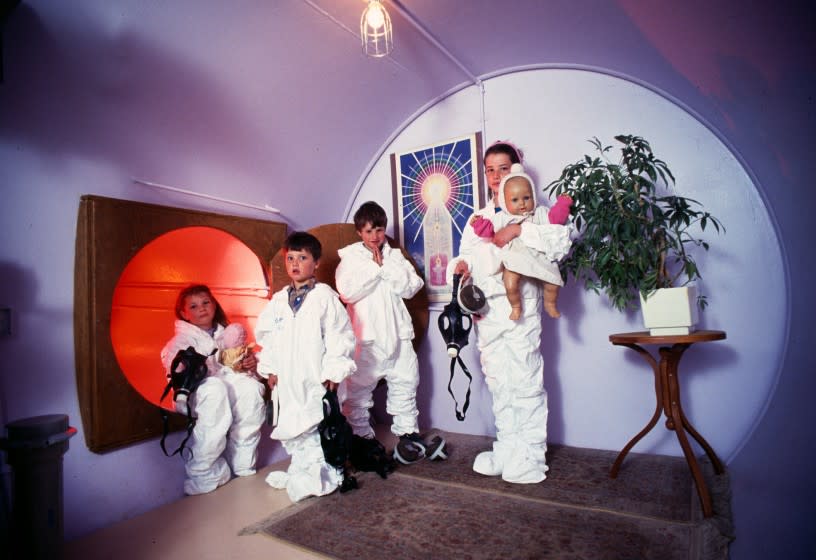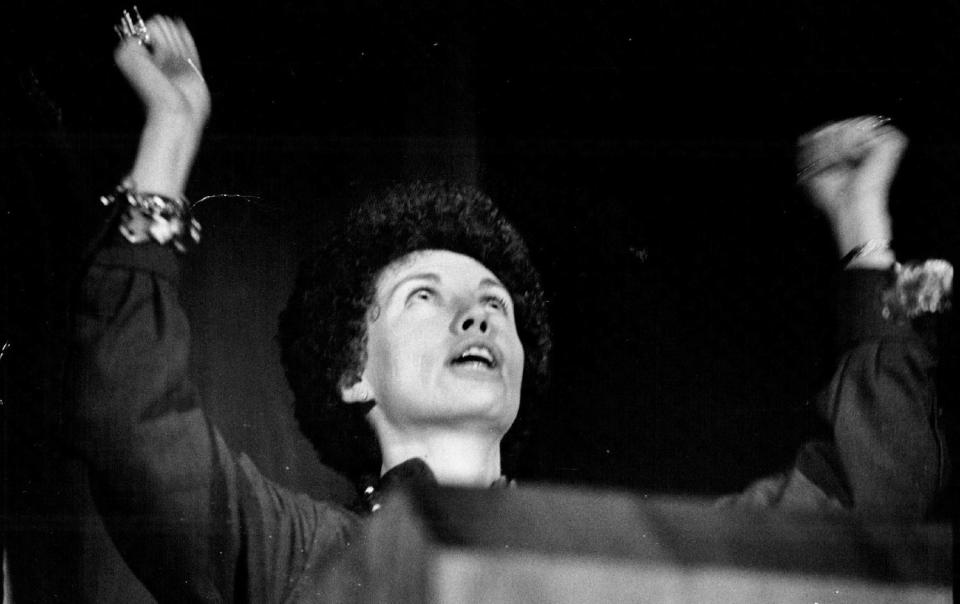Op-Ed: I spent my childhood preparing for calamity. No wonder the coronavirus crisis feels familiar

I recently began to use a bottle of ointment I purchased more than 30 years ago, during what I call the “shelter episode.” That’s when thousands of members of my mother’s church moved from California to Montana to build what I believe is still the largest privately owned group of fallout shelters in the United States.
We were prepping not just for nuclear war, but for a series of disasters that my mother, Elizabeth Clare Prophet, had predicted in her “Vision of the Four Horsemen” — including economic collapse and waves of epidemics, along with earthquakes and windstorms.
Prophet was our family’s actual surname, but for my parents, the name was much more than that. They presented themselves as prophets in an Old Testament sense, as receivers of divine messages and interpreters not only of the Bible but of “new age” and Eastern scripture. And because thousands of us believed in their prophecies, we prepared. We built an underground storage bunker the size of an aircraft hangar and stocked it with what we calculated would be seven years of supplies — including pallets and pallets of toilet paper, a generator that could run on wood chips and a variety of weapons to protect our stockpile during the anticipated anarchy.
I suppose it’s no wonder, given my background, that the COVID-19 panic feels familiar. I spent my childhood anticipating calamity. Then, in 1987 when I was a young adult, we moved to Montana to prepare in earnest. In the spring of 1990, after our “danger period” had passed without disaster, some people lost faith in the church, but others convinced themselves that it was our prayers and preparations that had averted the prophecies.

My doubts led me to leave the church in 1992, and my mother is no longer living, but I’ll wager that some of her most faithful followers now see the advent of the coronavirus pandemic as proof that she was right all along — just 30 years premature. That’s the problem with apocalyptic prophecy: It can always be adapted to fit the latest headlines.
A Christian friend recently texted me I Thessalonians 5:3, “For when they shall say, Peace and safety; then sudden destruction cometh upon them, as travail upon a woman with child; and they shall not escape.” I reminded him that the Bible contains a wealth of all-purpose disaster quotations. Finding a biblical prophecy to fit the coronavirus pandemic, as some Christians are now doing, is one way to allay fear in a situation that seems out of control.
And it’s not just Christians who are reading signs into our current crisis. Some new age adherents believe the coronavirus will inaugurate a global “shift” in consciousness, while some environmentalists predict this is only the beginning of a chain reaction to our collective folly that will eventually return us to a pre-agricultural, hunter-gatherer society. But the trouble with any of these scripts is that they can support fatalism and a save-yourself-first mentality.
Thankfully, there is another way people commonly respond to crises like this one. It’s a common (but wrong) assumption that when prophecy fails, religious people either abandon their belief systems altogether or reduce their cognitive dissonance by continuing to promote their system in spite of evidence. A far more frequent response, as religion scholars have demonstrated, is for people to transform their expectations into something more positive and this-worldly. Many of those who participated in my mother’s shelter episode went into the helping professions and quite a few modified their beliefs. After all, apocalypticism is usually more about a search for justice and restoration than a realistic vision of the future.
Global disasters, prophesied or not, do have a way of pushing a reset button on religious belief, and they will do so again in this crisis. Personally, I am hoping that kids who grew up reading Left Behind novels and anticipating the Rapture will begin to realize that any transformation of the world, whether in preparation for the Lord’s return or simply in response to events, will be accomplished by us, real people working together, regardless of religious belief or doctrines.
In 1990, we certainly didn’t want the catastrophes my mother was predicting to happen. But we nevertheless put enormous effort into preparing for them. What a lot of us eventually came to see was that, no matter how prepared we were, no matter how much stuff we had laid in, humans really do need civilization and what it has to offer.
Today, as we look out on our empty streets and squares, I hope we will see the ways in which this moment exposes the weaknesses in our culture and channels our desire for change not into isolation and world-denial but into the slow but ultimately more satisfying process of building the world we want.
Erin Prophet is a visiting assistant professor of religion at the University of Florida. She is the author of "Prophet’s Daughter: My Life with Elizabeth Clare Prophet inside the Church Universal and Triumphant." Twitter: @ErinProphet

